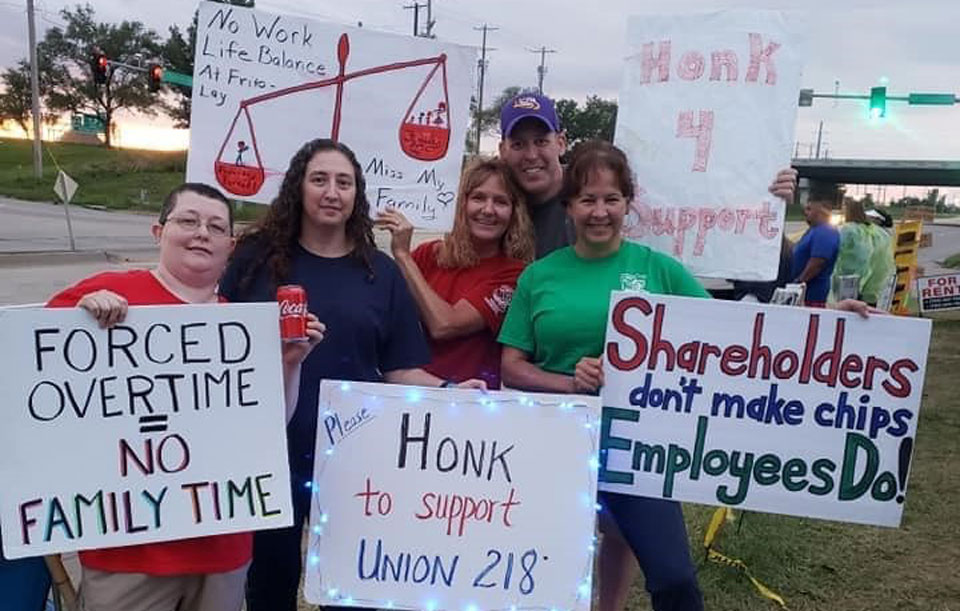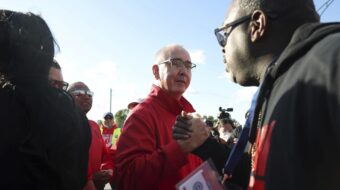
TOPEKA, Kansas—To ordinary human ears, this sounds like a throwback to worker exploitation of the Gilded Age: Some 850 workers at the Topeka, Kansas, Frito-Lay plant were forced to strike early this month over—ready?—84-hour workweeks.
And after more than two weeks on the picket line, and outrage which has spread overseas, the company now offers the workers, members of Bakery, Confectionery and Tobacco Workers and Grain Millers (BCTGM) Local 218, a shorter workweek: 60 hours.
And Frito-Lay says workers can volunteer for the 84-hour weeks, too.
All this for a 2% hourly raise for each of the next two years. No wonder the workers had to walk.
The latest bargaining sessions occurred July 19-20, and no information has been posted about the results. Meanwhile, Frito-Lay claims that in Kansas, a right-to-work-for-less state, 300 workers have crossed the union picket line. The firm’s claim could not be verified.
It also claimed local leaders agreed to the economic sections of the deal, including the raises and the shorter workweek. But its letter admitted Local 218 members voted that down.
In a potential indication of progress, the union, on July 12, asked the National Labor Relations Board to withdraw two labor law-breaking—formally called unfair labor practice—charges filed on June 30 against Frito-Lay, a PepsiCo subsidiary.
One charge covered unilateral company changes to the union contract. The other cited surface bargaining and Frito-Lay’s effort to directly bargain with the workers, over the union’s head. The firm sent a letter to all the workers, whom it calls “associates”—just like notoriously union-hating Walmart does for its workers—also dated July 12.
“This strike is about more than wages and benefits. It is about the quality of life for these workers and their families,” BCTGM President Anthony Shelton said. The workers, he added, “were left with no choice but to strike.
“Despite our repeated warnings to the management of Frito-Lay over the last decade, current employees are being forced to work seven days a week, up to 12 hours per shift. Many of the more than 800 workers are only getting an eight-hour break between shifts,” Shelton continued.
The company, in its letter, admittedly called those schedules “squeeze shifts.” The workers call them “suicide shifts.” Their picket line mascot is a skeleton.
“They are forcing the current workforce to work double and triple shifts. Workers do not have enough time to see their family, do chores around the house, run errands, or even get a healthy night’s sleep. This strike is about working people having a voice in their futures and taking a stand for their families,” Shelton added.
The workers, via tweets to the local, sounded the same themes: Long shifts and little to no pay raises.
“I am striking for a pay raise. I have only received $.83 raise in the last 10 years,” 18-year worker Therese Lundgren tweeted.
“I’m striking for more time to see my family. Period,” three-year worker Charles Taylor added. John Reeve, a four-year worker, had a similar tweet: “I’m striking because of the unfair working conditions and to spend more time with my family. Especially my two-year-old daughter.”
“OT is just as bad today as when I started here 23 years ago,” said Linde Carson.
“This is not a good job,” 37-year worker Mark McCarter wrote to Relevant magazine. “At 7 a.m. our warehouse is 100 degrees. We don’t have air conditioning. We have cooks in the kitchen on the fryers that are 130 or 140 degrees making chips and sweating like pigs. Meanwhile, the managers have A/C.”
The forced strike has drawn widespread notice. Shelton passed along supportive statements to the local from the Agro-Industrial Union of Ukraine and from a union coalition in Belgium, and from Sen. Bernie Sanders, Ind-Vt.
There have also been demands, from outside supporters, for a boycott of PepsiCo products, which range far beyond its namesake colas and the chips the Topekans turn out.
“Frito-Lay made more than $4.2 billion in sales last year. But they can’t be bothered to provide fair wages and safe working conditions? I don’t think so. I stand with the workers on strike in Topeka. It takes enormous courage to stand up and fight back, and I applaud you,” Sanders tweeted.
EDITORS NOTE: An earlier version of this story incorrectly identified the first name of the BCTGM president giving him the first name (Chris) of the CWA president.












Comments